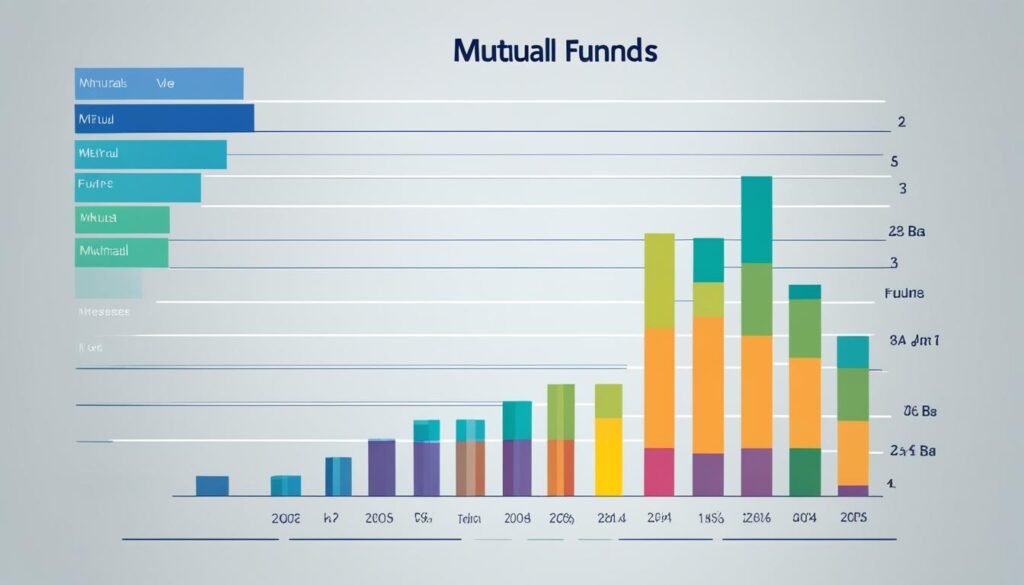Retirees in India are looking for steady monthly income sources. They have many investment options to choose from. These include the Senior Citizens’ Saving Scheme (SCSS), Post Office Monthly Income Scheme (POMIS), bank fixed deposits (FDs), and monthly income mutual funds (MIPs).
Each option has its own benefits. They offer regular interest, tax benefits, and different risk levels. This lets retirees create a portfolio that fits their financial goals and how much risk they can take.
Key Takeaways
- Monthly income mutual funds (MIPs) provide retirees with a steady stream of regular payouts, often on a monthly or quarterly basis.
- MIPs invest in a mix of equity and debt instruments, offering the potential for capital appreciation along with regular income.
- Retirees can choose from a variety of MIP options, including equity-oriented, debt-oriented, balanced, dynamic, and growth-oriented funds.
- Top-performing MIPs for retirees in India include ICICI Prudential Retirement Fund, HDFC Retirement Savings Fund, and Nippon India Retirement Fund.
- Investing in MIPs can provide retirees with a diversified portfolio, inflation-adjusted returns, and tax-efficient payouts.
Understanding Monthly Income Mutual Funds
Monthly income mutual funds (MIPs) are special funds that aim to give investors regular income. They put a big part (usually 65% or more) into bonds and debentures. The rest goes into stocks.
What Are Monthly Income Mutual Funds?
These funds are made for investors who want regular money coming in, like retirees. They focus on giving out income regularly, not just growing in value. This makes them great for those who need steady money.
How Do Monthly Income Mutual Funds Work?
These funds put money into things like government and corporate bonds. They also invest in stocks a little bit. The money they make from these investments is given to investors every month or quarter.
The way they pick what to invest in is to balance making money now and growing wealth over time. The bonds give steady income, and stocks could grow in value. This way, investors get regular money and a chance for their money to grow.

“Monthly income mutual funds offer a unique solution for retirees and investors seeking a regular flow of income, while also providing the opportunity for capital appreciation over time.”
Types of Monthly Income Mutual Funds
Monthly income mutual funds in India vary by their investment focus and risk level. They meet the different needs of retirees looking for a steady income. Each type of fund offers a unique way to earn money regularly.
Equity-Oriented MIPs
Equity-oriented MIPs put most of their money into stocks and some into bonds. They aim for high returns and regular income. These funds try to grow your money while giving you a steady cash flow.
Debt-Oriented MIPs
Debt-oriented MIPs focus on bonds and government securities. They offer a steady income with less risk. These funds focus on keeping your money safe and providing a reliable income.
Balanced MIPs
Balanced MIPs mix stocks and bonds to balance risk and income. They aim for a steady income and some growth. This approach helps manage risk while still growing your money.
Dynamic MIPs
Dynamic MIPs change their stock-to-bond ratio based on market conditions. This flexibility helps them take advantage of opportunities and manage risks. They aim to give you the best returns possible.
Growth-Oriented MIPs
Growth-oriented MIPs focus more on growing your money than on regular income. They invest more in stocks. These funds are for retirees who want to grow their wealth over time and can handle more risk.
When picking a monthly income mutual fund, retirees should think about their goals, how much risk they can take, and when they plan to use the money. This helps them choose the fund that fits their financial plans and preferences.

Top 10 monthly Income mutual fund for retired person in India
Retirees in India look for steady income sources. Monthly income mutual funds are a great option. They offer regular dividends or interest, perfect for a stable retirement income. Here are the top 10 monthly income mutual funds for retired people in India.
- Tata Retirement Savings Fund – Direct Plan – Progressive Plan: This fund has delivered a monthly return of 1.43% and a YTD (Year-to-Date) return of 21.30%.
- Nippon India Retirement Fund – Wealth Creation Scheme – Direct Plan: The fund’s returns for the last 2 years were 43.09% and 36.15%, respectively.
- HDFC Retirement Savings Fund – Equity Plan – Direct Plan: The fund has a 3-year return of 35.43% and a 5-year return of 23.75%.
- Axis Retirement Savings Fund – Aggressive Plan – Regular Plan – Growth: This fund achieved a 1-month return of 3.95% and a 3-year return of 22.46%.
- Aditya Birla Sun Life Retirement Fund – The 50s Plus – Debt Plan – Direct: The fund recorded a 1-month return of 0.71% and a 3-year return of 6.54%.
Other notable monthly income mutual funds for retirees in India include the Union Retirement Fund – Regular Plan – Growth, which displayed a 6-month return of 13.83% and a YTD return of 18.93%, and the ICICI Prudential Retirement Fund – Hybrid Aggressive Plan – Direct Plan, which posted a 1-year return of 48.15% and a 5-year return of 23.96%.
Choosing the right monthly income mutual funds for your retirement is key. Think about your risk tolerance, investment time frame, and financial goals. Diversifying your investments and matching them with your retirement needs can help you build a steady income stream for your golden years.
Advantages of Monthly Income Mutual Funds
Monthly income mutual funds, or MIPs, are great for retirees in India. They offer a steady income, the chance for your money to grow, and diversification. These features make them a smart choice for those wanting financial security in their later years.
Regular Income Stream
Investing in monthly income mutual funds means getting regular money. They pay dividends or interest every month or quarter. This steady cash flow can help pay for daily needs and keep your finances stable in retirement.
Potential for Capital Appreciation
These funds focus on regular income but can also grow in value over time. By mixing debt and equity, they can benefit from the stock market’s growth. This means your investment could increase in value.
Diversification
Monthly income mutual funds spread your money across different types of investments. They include government bonds, corporate bonds, and stocks. This spread helps lower the risk in your retirement savings, making your investments more stable.
Looking to boost your retirement income, protect your savings, or diversify your investments? Monthly income mutual funds are a strong option for retirees in India. By knowing their benefits, you can make smart choices to secure your financial future and enjoy a comfortable retirement.
Risks of Monthly Income Mutual Funds
Monthly income mutual funds (MIPs) have many benefits but also come with risks. These risks can affect how often and how stable the income is, and the investment’s performance.
Market Volatility Risk
The equity part of MIPs can go up and down with the market. This can change how well the fund does and how often it pays out. When the market is unstable, the fund’s value and income can drop.
Interest Rate Risk
Interest rates can change and affect the value of the debt in MIPs. If interest rates go up, the value of the debt can go down. This can lead to less income and lower monthly payments.
Credit Risk
MIPs invest in debt like corporate bonds. If these bonds default, the fund’s income and value can drop. This can make the monthly income less reliable.
It’s important for investors to know the risks of MIPs and match their goals and how much risk they can handle. Spreading out investments, keeping an eye on them, and thinking long-term can help manage these risks.
Taxation of Monthly Income Mutual Funds
Monthly income mutual funds (MIPs) in India have different tax rules based on the fund type and how long you’ve held the investment. It’s key for retirees to know these rules to plan their taxes well.
Taxation on Debt-Oriented MIPs
Debt-oriented MIPs earn interest income, which gets taxed based on your income tax rate. So, your tax on the MIP’s interest depends on your personal income tax bracket.
Taxation on Equity-Oriented MIPs
Equity-oriented MIPs have their own tax rules. If you hold these funds for over a year, the dividends are taxed at 10%. But, if you hold them for less than a year, you pay taxes on any gains at your top tax rate.
| Mutual Fund Type | Holding Period | Tax Treatment |
|---|---|---|
| Debt-Oriented MIPs | N/A | Interest income taxed as per investor’s slab rate |
| Equity-Oriented MIPs | More than 1 year | Dividends taxed at 10% (without indexation) |
| Equity-Oriented MIPs | Less than 1 year | Short-term capital gains taxed at marginal tax rate |
Retirees should think about the tax rules for MIPs and plan their investments to get the most after taxes.
Investing in Monthly Income Mutual Funds
For retirees in India, picking the right monthly income mutual funds (MIPs) is key. It ensures a steady and dependable retirement income. There are two main things to think about when investing in MIPs:
Choosing the Right Fund
Retirees should look at the fund’s goals, how it’s invested, its risk level, past results, and costs. This helps them find an MIP that meets their financial goals and how much risk they can handle. For example, someone who wants less risk might choose a debt-focused MIP. Those looking for growth might pick an equity-focused MIP.
Investment Strategies
Retirees might use a systematic withdrawal plan (SWP) to take out a set amount from their MIPs regularly. This ensures a steady income in retirement. Also, spreading investments across different MIP types, like equity, debt, and balanced funds, can help manage risk.
By picking the right MIPs and using smart investment strategies, retirees in India can make the most of these funds. This approach helps them get a steady monthly income and grow their retirement savings over time.
“Investing in monthly income mutual funds can be a valuable part of a retiree’s overall financial plan, providing a reliable source of regular income and the potential for capital appreciation.”
Conclusion
Monthly income mutual funds are great for retirees in India. They offer regular income and the chance for your money to grow. By knowing the different types, their benefits, risks, and tax rules, retirees can make smart choices. This helps them plan for their financial future.
Choosing and placing your money wisely in these funds is key for a good retirement. They come in various types, from equity to debt options. This lets retirees match their investments with their risk level and goals.
When looking into monthly income mutual funds, retirees can get help from financial advisors. These experts can guide them to the best options for their situation. By using these funds well, retirees in India can enjoy a secure retirement. They’ll have a steady, tax-smart income every month from their investments.



